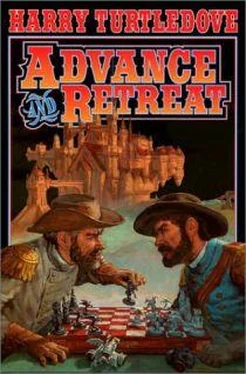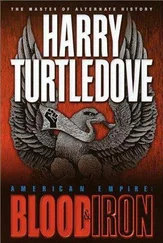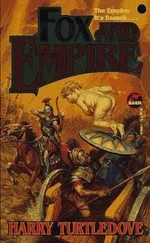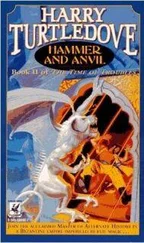“I sure do,” Biffle replied. “And don’t I wish I didn’t?”
“Can’t be helped,” Ned of the Forest said. “Everything’d be a lot easier if we only had to fight when we were sure of winning. But sometimes we have to stand up there and prove we are men. Don’t you reckon that’s right?”
Colonel Biffle gave him a reluctant, half shamefaced nod. They rode on together toward Poor Richard. It wasn’t far.
* * *
John the Lister looked back toward the Trumpeteth from the position he’d chosen for his army, just outside the little town of Poor Richard. His men dug like moles at the high end of a long, bare stretch of ground that ran north for a couple of miles. Turning to his adjutant, he said, “If the traitors care to attack me here, I will give them a warmer greeting than they care for.”
One of Major Strabo’s wandering eyes looked towards one stretch of the lines the southrons were preparing, the other toward another. “The devils in the seven hells might give them a warmer greeting than we can. No one else, I think.”
“They cannot flank us out here, as they did before,” John said.
“No, indeed,” Strabo said, looking around his superior. “They would be idiots to try, which may not stop them.”
“We’ve got a glideway line straight back to Ramblerton,” John the Lister said. “Doubting George can send us all the food and bolts and firepots and fodder we need, and the line’s well fortified.”
“Yes, sir.” Major Strabo pointed toward the line of entrenchment; his finger, unlike his eyes, went straight. “As you say, they’ll likely be through if they try to go through us.”
“They’d be idiots to try to do that, too,” John said. “In fact, if you ask me they were idiots to mount this whole invasion. Why isn’t Bell fighting General Hesmucet? As far as I can see, none of the traitors is off fighting Hesmucet. How can they call themselves a kingdom if he marches across Peachtree Province to Veldt and the Western Ocean?”
“Simple, sir,” Strabo answered. “They can lie.”
“That’s about what it comes down to, sure enough,” John the Lister said. “As a matter of fact, that’s just what it comes down to. Hesmucet was right: once you crack the shell, there’s nothing but wind and air behind it.”
“Some of that wind and air is coming this way,” his adjutant pointed out.
“Let ’em come,” John replied. “If they want to charge up that slope, in the face of everything we can throw at ’em, they’re welcome to try. Have we got the engines lined up where they’re supposed to be?”
“Yes, sir. Catapults and repeating crossbows both,” Major Strabo said. “And we’ve got plenty of stones and firepots and bolts for them. If all the traitors in the world want to charge up that slope against us, I think we can murder the lot of them.”
John eyed Strabo with more than a little surprise. His adjutant was no blithe optimist. Strabo, in fact, was inclined to see difficulties whether they were there or not. If he thought the southrons would have no trouble holding this position, he was likely to be right. John certainly hoped he was right.
At the same time, John wondered what Lieutenant General Bell would do when he saw what sort of position the southrons had at Poor Richard. He wouldn’t have an easy time assailing it, even if his army was close to twice as big as John’s. He couldn’t ignore it and keep marching south, either.
What did that leave? Nothing John saw just then.
Maybe Bell will give up and go away. Maybe he’ll throw his hand in the air and march back to Dothan. John the Lister laughed.
“What’s funny, sir?” Major Strabo asked. John explained. Strabo laughed, too. “The likelihood of that is most unlikely,” he said, a sentence obscure even by his standards.
“Uh, yes,” John said.
“Bell’s options are impenetrable in their opacity,” Strabo added.
“Not only that, nobody has a real good notion of what the son of a bitch will do,” John said.
“Indeed,” Strabo said. “And in fact.”
“That, too,” John agreed gravely. “Now, in fact, I’m going to round up the famous Major Alva, see what more help he thinks he can give us here, and have another look at our works, make sure everything is sited just the way I want it.”
“Yes, sir,” Strabo said. “The one thing we haven’t sighted is the traitors.”
John thought about groaning at that, but decided not to bother. Strabo’s plays on words were frequent enough-and bad enough-that acknowledging them only encouraged him to do worse. John sometimes thought he couldn’t do worse, but his adjutant kept proving him wrong.
He waved for a runner. “Yes, sir?” the young man in gray asked.
“Tell Major Alva to meet me at the top of the slope there.” John pointed. “Tell him I want to see him as soon as he can get there.” Doubting George had warned him Alva was a free spirit. From everything John had seen so far, Doubting George had understated things.
But the wizard got to the field fortifications in good time, only a couple of minutes after John the Lister himself. And Alva did remember to salute. He looked as if he was reminding himself of something before he did it, but he did salute. Then he said, “Tell me, sir, what do you think of the Inward Hypothesis?”
Of all the questions John had expected to get on what might become a battlefield, that one might have been the very last. He blinked, wondering if he’d heard rightly. Deciding he had, he answered, “I don’t really know, Major. It’s not something a soldier needs to worry about, is it?”
He’d done his best to dodge the question. He learned trying to evade Alva wasn’t a good idea. The wizard’s eyebrows shot up, as if he couldn’t believe his ears. He said, “Don’t you think it’s important for every Detinan-for everyone in the whole world-to wonder about how the gods fit into the scheme of things? If they say, ‘Be,’ and something is the very next heartbeat, then we look at them one way. But if they say, ‘Be after you go about shaping yourselves and changing for thousands or maybe millions of years,’ then we look at them another way altogether. Or I do, anyhow. What about you, sir?”
“When I need to worry about the gods, I’ll worry about them,” John the Lister said. “Till then, I’m going to worry about Lieutenant General Bell more, because I expect he’ll be here sooner.”
He waited to find out how the contentious wizard would take that. To his surprise, Alva beamed. “Well said, sir. I couldn’t have put it better myself. Worrying about things of this world ahead of the gods is always a good idea-as far as I’m concerned, anyway.”
“You must have some interesting talks with priests,” John remarked.
“Oh, I do, sir,” Alva said earnestly. “They can believe what they want, as far as I’m concerned. They’re free Detinans, after all. But they don’t seem to understand that I’m a free Detinan, too. They want me to stop thinking what I think. It doesn’t seem fair.”
“I can see how it wouldn’t,” John said. “But then, how often do they run into someone who doesn’t believe in the gods?”
“I believe in the gods, sir.” Alva sounded shocked that John should doubt him. “I just don’t believe they’re very important.”
“Do you? Or do I mean, don’t you?” John the Lister shook his head. “I can see how priests might have trouble drawing the distinction.”
“Can you? Could you explain it to me, sir? I’ve never been able to figure out how anyone wouldn’t want to draw the finest distinctions he could.”
He’s not joking , John realized. He does want me to explain it. Can I? Picking his words with care, he said, “To somebody who’s a priest, to somebody who thinks about the gods all the time, not believing in the gods at all and not believing they’re very important probably don’t seem much different.”
Читать дальше












